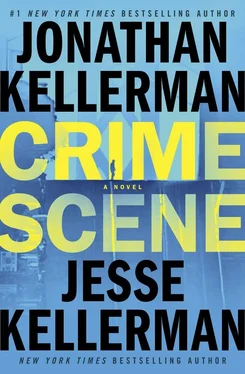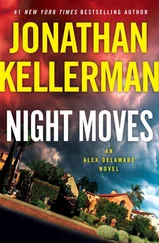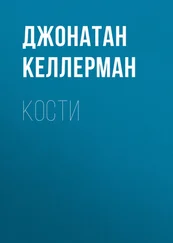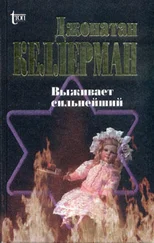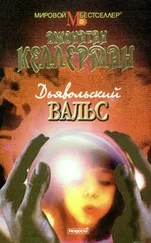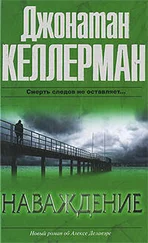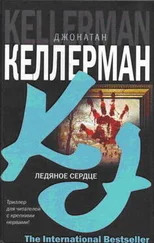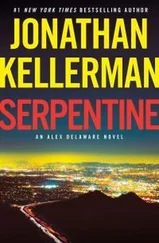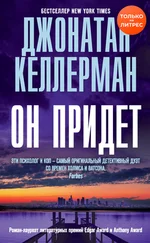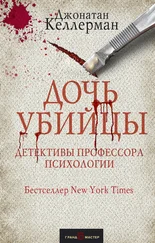“Yes.”
“So at that point, at least, they were still close.”
“Yes, noble Walter, falling on his sword. You see, my dear, what you fail to grasp is how much it pleased him to martyr himself.”
The notion of Rennert as masochist rang true. And it pointed to a line of succession for Walter Rennert’s self-destructive affection: from his sons to Linstad. From Linstad to Triplett.
Not much room left for Tatiana. With her, the pattern was reversed: she was the one sacrificing herself for him.
I said, “What caused the rift between him and Linstad?”
“Everyone disappoints in the end.”
A logical conclusion for a woman married five times. “How did Walter react to the news of Nicholas’s death?”
No answer.
“He talked to you about everything else,” I said. “He didn’t talk to you about that?”
For a moment she sat motionless.
She said, “Let’s get one thing perfectly clear: I don’t know where the boy is now.”
She looked at me. “All right? You can put me in the rack, it won’t do any good.”
I nodded.
She cleared her throat, took a sip of her tea. “The night Nicholas died, Walter phoned me up.” She paused, corrected: “Not that night, the next day, early. He said he needed to see me, right away. He was adamant. He said, ‘I can’t drive, you have to come here.’ I refused, of course, and next thing I know he’s pounding at my door. I was living in the Sunset then. He showed up looking like a wet dog, with his hair stuck down to the top of his scalp. He was drunk, which I suppose is why he didn’t want to drive. I almost slammed the door in his face but he looked so pitiful. He said, ‘There’s been an accident.’ ”
“What kind of accident?”
“He wouldn’t elaborate,” she said. “He had the boy with him in the car. He asked, would I put him up for a few days while he thought things through. The place I was in had a little garage. I said he could sleep there temporarily.” Wistful smile. “That tells you what you need to know about the depth of our love. For all I knew, I was sheltering a killer. But Walter assured me I’d be safe, and I trusted him.”
“How long did Triplett stay with you?”
“Walter picked him up the next day.”
“Where did they go?”
She shook her head. “I told you. I don’t know.”
I assumed she was lying. But I could detect her patience thinning, and I didn’t think that going at her any harder would yield the truth.
“You never reported any of this,” I said.
“Report what? I had no idea Nicholas had died until weeks later. Then I drew my own conclusions.”
“That?”
“The boy had killed Nicholas, Walter was protecting him.”
“Is that what you still believe?”
She said, “I believe people get what they deserve.”
At Amy’s insistence, I chose the restaurant. She’d lived away for nearly a decade, and her ideas about where to go and what to do were “fossilized in adolescence.”
She left her car at my place, and we drove together to Temescal, parking on a grim, unlit side street. In her gray peacoat and scarf, she looked like an authentic New Englander, moving comfortably in the cold, our sleeves brushing as we reached the bright, sharp scene sprung up along Telegraph Avenue.
All around us was the same head-on collision — between poverty and frivolity, bleeding need and fussy want — resonating throughout Oakland.
Art gallery. Bike co-op. Flannel and stiff denim.
Drugstore. Bus stop. Abandoned lottery tickets and blackened gum.
“We never used to call it Temescal,” Amy said.
“What did you call it?”
“The ghetto.”
Outside the Burmese restaurant there was, as always, a crowd.
“They don’t take reservations,” I said. “We can go somewhere else if you’re hungry.”
I pointed north. “Organic pizza.”
I pointed south. “Jack in the Box.”
Amy smiled. “I’m fine waiting.”
Over bowls of samusa soup, we caught each other up. She was in the clinical track at Yale, writing her dissertation on PTSD in female veterans, working at the West Haven VA. Proximity to damaged souls had converted her into a zealous advocate for small pleasures.
“I cannot believe you’ve never watched Naked and Afraid, ” she said. “It’s the best example of my absolute favorite TV genre.”
“Which is.”
“ ‘Idiots in the woods.’ ”
She shared an apartment with one of her old volleyball teammates who was at the divinity school. She didn’t get to play her game much, either, these days.
She hadn’t told her parents yet — she didn’t want to get their hopes up — but she was toying with moving back to the Bay Area. She’d poked around the job market.
“Lot of demand,” she said, wiping her mouth, “lot of supply.”
I kidded her about her father’s ham-fisted attempts at matchmaking; our laughter chased by a secondary laugh, as we both acknowledged, inwardly, that he’d succeeded.
Reaching to dish her more garlic noodles, I noticed that I was sitting up taller, my body big and open. I’d been carrying around so much tension for so long that it had become my resting state, imperceptible until I was free of it.
No conflicts of interest hissing in the background. No power dynamics to negotiate.
It tells you a lot about my state of mind just then that our ease with each other made me suspicious. There we were, behaving as though we had a history — detailed, rich, important — when in reality, we’d seldom gone beyond hi how are you fine thanks. What else could we have said? Back then she was the Professor’s Daughter: sixteen, lovestruck, dumbstruck. I was twenty-one, riding the hardest downward slope of my life, myopic and full of self-pity. But they call those years formative for a reason. Memories retain their pungency. Faces and personalities imprint, assuming an importance out of proportion. The context had shifted; we had shed those selves. And yet they remained molds, priming us for this present, a reincarnation in more compatible shapes.
Now she was a sly, funny, beautiful, perceptive woman.
Now we were equals.
She asked about my family.
“They’re okay,” I said. “I saw my folks on Sunday.” I felt the same blockage rising in my throat as when Tatiana asked me if I had siblings.
Amy already knew, though. I didn’t need to hide anything from her.
I said, “I’ve been thinking about something my mom said.”
She put down her utensils and paid attention.
“She asked why I’m so angry at Luke. She wants to know why I don’t visit him.”
“What did you say?”
“I didn’t. I turned it around on her. I couldn’t help myself, she put me on the spot.”
Amy nodded. “All right,” she said. “Do-over. What would you say to her now?”
I thought about it. “I’m not angry at him. I mean, I am, on some level. But that’s not the reason I don’t go.”
I paused. “Have you ever seen him?”
She shook her head.
“He looks like me,” I said. “We could switch clothes and trade seats and nobody would notice. He could walk out of there and I’d be stuck behind bars.”
“Too close for comfort,” she said.
“I worshiped him,” I said. “What are we going to say to each other now? I can’t go. I used to. Every time I’d feel like shit for days afterward. I can’t do it.”
We let the babble of the restaurant briefly insulate us.
I said, “I’ve been thinking about him a lot lately. It has to do with this case. They’re not the same, not remotely. I can’t stop, though.”
Amy reached across the table and took my hand.
Читать дальше
